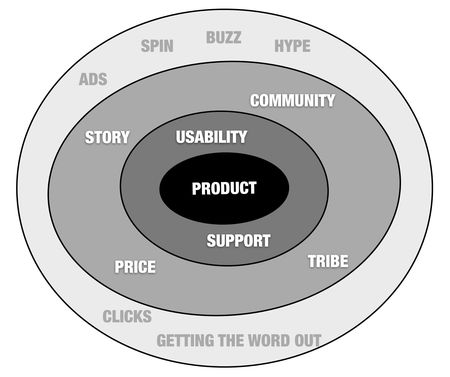
Few marketers, and even fewer entrepreneurs and business owners, realize the significance of WordPress. With the hype and popularity of Tumblr (to be sure, it’s growing like a weed), this CMS (Content Management System) is easily discarded as a tool used by blogs and bloggers. Any idea how many blogs are in the world? I don’t know, sorry, I’m not doing that much digging, but as of right now there are  71,863,541 websites powered by WordPress. If your marketing plan has anything to do with reaching your audience through other sites, WordPress is where to focus your attention – arguably, all of your attention.
71,863,541 websites powered by WordPress. If your marketing plan has anything to do with reaching your audience through other sites, WordPress is where to focus your attention – arguably, all of your attention.
How exactly you engage with WordPress site owners depends on your business. A graphic designer could do something as simple as creating some exceptional themes with which to get the attention of websites – a theme for photographers would put your services in front of more photographers than you could probably otherwise manage in short order. An accounting application could develop a plugin that integrates with any of the eCommerce platforms on WordPress to automatically record transactions. A local, mobile app like Forecast or Highlight could develop a sidebar widget that the author or business can use to show off where they like to hang out. Moodfish could help restaurant websites feature events that suit the atmosphere of the restaurant. An analytics platform or someone working in social media could put on business WordPress dashboard stats about the performance of their marketing, website, or social networks. The point is, a little creativity and you can conceive of some way to leverage this network of nearly 100 MILLION websites on your behalf.
Article Highlights
Making a WordPress Plugin that Works
I’ve had the privilege of spending the last few months helping FoxTranslate develop an incredible simple and powerful plugin that translates the pages of your site in to different languages. FoxTranslate’s foundation is in document translation and while they increasingly provide inexpensive transcription and related services, they are not in the business of translation software. But web site translation is not that far removed from document translation, indeed, FoxTranslate has translated far more than documents, from apps to sites, so a plugin to automate the process for businesses and site owners wasn’t that much of a stretch.
Why invest in software, a plugin, when you’re business isn’t remotely related? Consider the nature of websites likely to need translated content? Certainly global corporations who work in dozens of languages every day. More than that though, consider the language professionals, travel services, immigration sites, and lawyers who deal in such services – every one of them not only benefits from a site in the various languages in which they work, they need documents translated and transcriptions inexpensively fulfilled.
Keep it Simple
The focus of SEO Translate (get the plugin here), as the plugin is called, was on simplicity for the site owners. I’d personally simplify the WordPress user market in two camps: 1. there are the designers, developers, and hardcore WordPress users who work with the platform 2. there are the small business owners, marketers, and bloggers who do not. A simple plugin, in fact any successful product or web service, appreciates the value of being accessible to everyone. In designing your plugi consider that the great majority of webmasters don’t know CSS and PHP; they don’t understand shortcodes, and they don’t want to spend time trying to figure out how to BE a developer in order to use a plugin that enriches their site. Keep your plugin simple and invest in the settings and features that make it as simple to use as possible. If you ever hire a developer to build you a WordPress plugin and they say that you should prioritize the development of functionality that makes it easy to change, redesign, or extend the plugin, shy away – while an extensible plugin is nice, you may be doing that at the expense of a plugin that the majority would use.
Be Available
As a hardcore WordPress site developer, nothing is worse that trying a new plugin and not being able to easily provide feedback, ask questions, or show your support. Think more creatively than a basic contact link or forum for support as the tools and technology available today make is simple to manage bugs, feature requests, and interaction with customers. From ZenDesk to a Facebook Page, your users and customers should be able to connect with you in near real time. Now, it’s important to understand that that doesn’t mean you have to be available all the time. SEO Translate features uservoice, a free, or inexpensive, platform that enables an audience to review FAQs, ask questions, and vote on features and enhancements. The Facebook Page for the plugin is accessible right within the settings.
Think Outside the Box
Obviously, the plugin translates your website so it can be read in other languages. There are many ways to do this and the most popular, but least valuable, way is to dynamically recreate the pages in the language on the fly – if you’ve ever translated a page with your browser using the Google Translate option that pops up, you’ll know what I’m talking about. Yes, that translates the page for the reader but it doesn’t actually create a translated page. There is a BIG difference in that, as far as search engines are concerned, the dynamically created translation doesn’t actually exist; Google doesn’t consider your site to be available in Spanish and therefore there is nothing for a Spanish speaking audience to find through Google. Indeed, SEO Translate creates translated pages for your site; thinking beyond the box, we’re not just translating a site, we’re creating content in the respective language and helping you reach the audience in that language. Making those translated pages truly accessible requires some thinking about SEO and the developers spent time ensuring it functions with other SEO related plugins, optimizes content, and appears in your sitemap to direct crawlers to the various languages in which your site now exists.
 Every good business owner, every successful entrepreneur, rock star sales professionals, and effective marketers all know that the key to their success is in delivering value. That’s all the more true of partnerships and the use of another web site to promote your business or service is partnership – you can only leverage turn to the likes of TED, NBC Sports, CNN, and tens of millions of others, by creating value for them through the publishing platform they prefer, and making it easy to benefit from the services you provide. An investment in a WordPress Theme or Plugin is not significant but the return in reaching 71,863,541 web sites is.
Every good business owner, every successful entrepreneur, rock star sales professionals, and effective marketers all know that the key to their success is in delivering value. That’s all the more true of partnerships and the use of another web site to promote your business or service is partnership – you can only leverage turn to the likes of TED, NBC Sports, CNN, and tens of millions of others, by creating value for them through the publishing platform they prefer, and making it easy to benefit from the services you provide. An investment in a WordPress Theme or Plugin is not significant but the return in reaching 71,863,541 web sites is.




Is the plugin now dead?
So is Foreca.st
So much for trying to promote the value of simplicity in plugins as a way to cross-promote a business!
Indeed WordPress has a reach to larger audience. A WordPress plugin really helps in the long run. I have already used it. Thanks for this useful suggestion.
Yep, blows a bit of a hole in my suggestion that using a plugin is good for business doesn’t it 😉